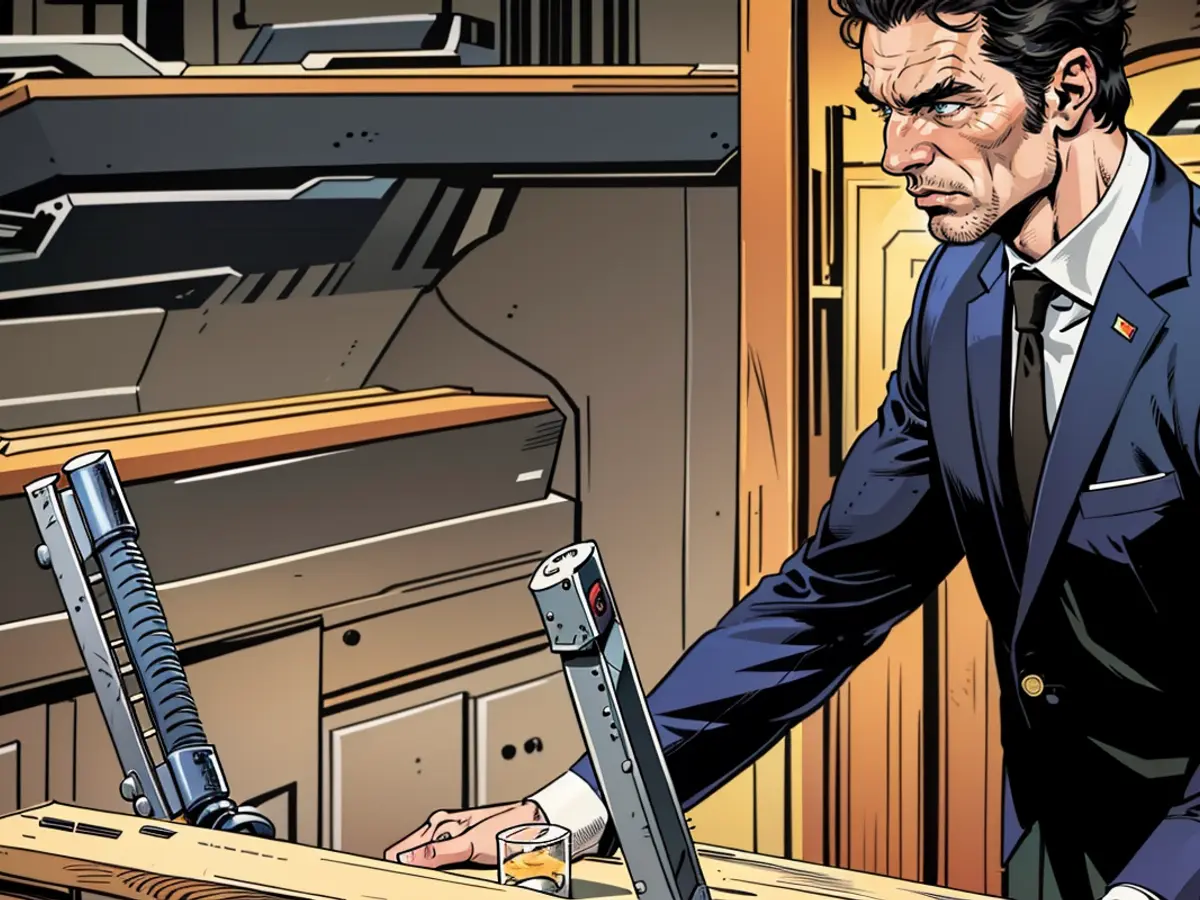- The Incident in Solingen: Shortcomings and Response
Following the horrific knife attack in Solingen a week ago, the North Rhine-Westphalia state parliament observes a moment of silence. Politicians stand in silence for a minute, with emergency responders who witnessed the chaos, the bloodshed, and the dying victims of the attack on the podium. "We pay our respects to you," said Minister President Hendrik Wüst (CDU). Throughout the two-hour special session, the rescuers received frequent applause for their heroic efforts, which pushed them to their limits the previous Friday evening.
Wüst declared this act of terrorism as a significant turning point. The attack had struck the very heart of the country. The parliament then proceeded to discuss the suspected Islamist attack, in which the attacker killed three people with knife wounds and injured eight more at a city festival. While Wüst called for stricter consequences than the hastily proposed security package by the federal coalition, the opposition accused the NRW's black-green state government of failure.
Finding the Right Balance
Wüst called for a "tactful approach" to the growing asylum and migration debate. "Competing for demands should not be the ultimate goal," he said. "Striking the right balance in discussing consequences will ensure public support," said the CDU politician. Elections were taking place in Thuringia and Saxony in two days, with concerns of the AfD gaining more power.
However, action was now necessary, said Wüst. The individual right to asylum in Germany would remain protected and not be questioned, he emphasized. Yet, hundreds of thousands of people who had come to Germany did not have the right to asylum.
Support for Green Minister
Wüst supported the Green refugee minister, Josefine Paul, who had been under pressure for days. "I am grateful that Minister Josefine Paul has thoroughly reported the situation to the parliament and the public," said Wüst in the special session of the state parliament. "She has already identified initial flaws and initiated improvements."
Wüst promised "maximum transparency" in investigating possible errors. But it should not be the employees of the authorities, who had been working at their limits for years, especially in the municipalities, who should be held accountable for the attack. "We will not address the causes of the problem in the immigration authorities or solve it locally," said Wüst. The federal government was responsible and needed to find effective solutions to the issue of irregular migration at last.
SPD Criticizes Black-Green
The arrested suspect in the Solingen attack, 26-year-old Syrian Issa Al H., had come to Germany via Bulgaria at the end of 2022 and should have been returned there under the so-called Dublin asylum rules last year. However, this did not happen because the man was not found at the designated time in the Paderborn state facility. The facility did not inform the Central Immigration Office, and no new flight booking was made.
"It's the deportation management of this government that failed," said SPD opposition leader Jochen Ott. He now expects "more self-criticism and no excuses" from the CDU. Deportation is the responsibility of the states. "And your government was unable to deport to Bulgaria, an EU country," said Ott to Wüst. "And they also had the responsibility." The SPD's demand for a special investigator to speed up the investigation of the terrorist attack is immediately rejected by the CDU. But the black-green coalition has already proposed a parliamentary investigative committee on its own initiative.
Paul Meets Emergency Responders
Refugee Minister Paul again blamed deficiencies in the EU relocation procedures for the failed timely deportation of the suspect, but this time also used more emotional language. She met the emergency responders prior to the session, she said, and thanked them for their "almost superhuman effort." Paul promised to continue investigating the case and improving the systems. However, failed relocations of rejected asylum seekers to the EU countries they first entered are more the norm than the exception, she emphasized. Green parliamentary group leader Verena Schäffer supported Paul: "What Europe hasn't achieved with the distribution of refugees over several years, one can hardly blame a North Rhine-Westphalian minister for."
Call for More Consistent Deportations
The FDP called for more consistent deportations. "We must also really consistently use the instrument of deportation detention," said FDP parliamentary group leader Henning Höne. NRW needs a second deportation detention facility - preferably near the Düsseldorf airport. People with a low likelihood of staying should no longer be distributed directly to the municipalities. AfD parliamentary group leader Martin Vincentz called for more toughness and not "rhetorical blanks against merciless terrorism."
Reul Criticizes Political Harassment
In Solingen, the city called on people to light a candle as a sign of mourning and solidarity at the time of the crime, 21:37, and place it in the window on Friday evening. Interior Minister Herbert Reul (CDU) had rushed to Solingen in the night of the crime. The images he will never forget: the empty square, the empty stage, the exhausted helpers everywhere - and the dead on the square. "I'm already getting older," says the 71-year-old long-time politician. "But I don't understand this political debate anymore and I don't want to partake in it anymore: this hunting and shouting and searching for responsibilities without even taking a single step forward."
Wüst expressed the need for a careful approach in the asylum and migration debate, stating, "Competing for demands should not be the ultimate goal, striking the right balance in discussing consequences will ensure public support."
The situation with the Green refugee minister, Josephine Paul, who had been under pressure, was addressed by Wüst, who said, "I am grateful that Minister Josefine Paul has thoroughly reported the situation to the parliament and the public."








